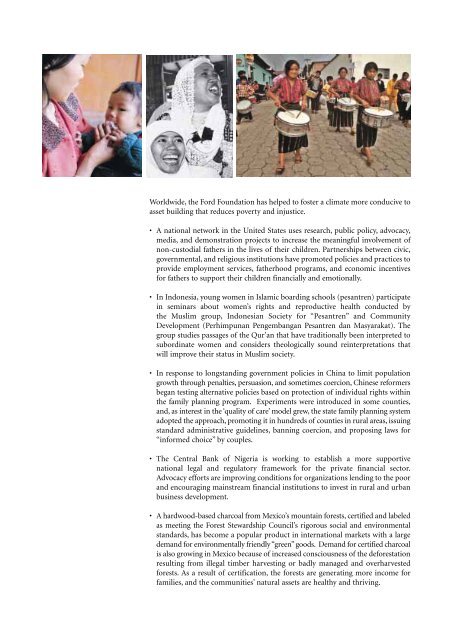Worldwide, the <strong>Ford</strong> <strong>Foundation</strong> has helped <strong>to</strong> foster a climate more conducive <strong>to</strong>asset building that reduces poverty <strong>and</strong> injustice.• A national network in the United States uses research, public policy, advocacy,media, <strong>and</strong> demonstration projects <strong>to</strong> increase the meaningful involvement ofnon-cus<strong>to</strong>dial fathers in the lives of their children. Partnerships between civic,governmental, <strong>and</strong> religious institutions have promoted policies <strong>and</strong> practices <strong>to</strong>provide employment services, fatherhood programs, <strong>and</strong> economic incentivesfor fathers <strong>to</strong> support their children financially <strong>and</strong> emotionally.• In Indonesia, young women in Islamic boarding schools (pesantren) participatein seminars about women’s rights <strong>and</strong> reproductive health conducted bythe Muslim group, Indonesian Society for “Pesantren” <strong>and</strong> CommunityDevelopment (Perhimpunan Pengembangan Pesantren dan Masyarakat). Thegroup studies passages of the Qur’an that have traditionally been interpreted <strong>to</strong>subordinate women <strong>and</strong> considers theologically sound reinterpretations thatwill improve their status in Muslim society.• In response <strong>to</strong> longst<strong>and</strong>ing government policies in China <strong>to</strong> limit populationgrowth through penalties, persuasion, <strong>and</strong> sometimes coercion, Chinese reformersbegan testing alternative policies based on protection of individual rights withinthe family planning program. Experiments were introduced in some counties,<strong>and</strong>, as interest in the ‘quality of care’ model grew, the state family planning systemadopted the approach, promoting it in hundreds of counties in rural areas, issuingst<strong>and</strong>ard administrative guidelines, banning coercion, <strong>and</strong> proposing laws for“informed choice” by couples.• The Central Bank of Nigeria is working <strong>to</strong> establish a more supportivenational legal <strong>and</strong> regula<strong>to</strong>ry framework for the private financial sec<strong>to</strong>r.Advocacy efforts are improving conditions for organizations lending <strong>to</strong> the poor<strong>and</strong> encouraging mainstream financial institutions <strong>to</strong> invest in rural <strong>and</strong> urbanbusiness development.• A hardwood-based charcoal from Mexico’s mountain forests, certified <strong>and</strong> labeledas meeting the Forest Stewardship Council’s rigorous social <strong>and</strong> environmentalst<strong>and</strong>ards, has become a popular product in international markets with a largedem<strong>and</strong> for environmentally friendly “green” goods. Dem<strong>and</strong> for certified charcoalis also growing in Mexico because of increased consciousness of the deforestationresulting from illegal timber harvesting or badly managed <strong>and</strong> overharvestedforests. As a result of certification, the forests are generating more income forfamilies, <strong>and</strong> the communities’ natural assets are healthy <strong>and</strong> thriving.
ASSETBUILDINGAT WORK:Asset <strong>Building</strong> In India:Protecting Reproductive HealthWomen in India’s remote villages <strong>and</strong> busy cities are being empowered <strong>to</strong> protect theirreproductive health—one of their most important assets—from violence <strong>and</strong> neglect.Community-based organizations throughout the nation are using educational,medical, legal, police, policy advocacy, family counseling, <strong>and</strong> other social services <strong>to</strong>ensure that women have safe pregnancies <strong>and</strong> childbirth, <strong>and</strong> better control over theirfertility <strong>and</strong> sexuality.These efforts aim <strong>to</strong> increase low-income women’s control over sexual <strong>and</strong> reproductivedecisions, <strong>and</strong> <strong>to</strong> address neglected reproductive health issues, domestic violenceprevention, <strong>and</strong> treatment of HIV/AIDS. In India, as in many other parts of the world,women have had insufficient access <strong>to</strong> adequate, comprehensive health services.Further, they face enormous barriers <strong>to</strong> using the criminal justice system <strong>and</strong> protectiveservices <strong>to</strong> prevent violence in the home <strong>and</strong> on the streets.The interconnectedness of disadvantages <strong>and</strong> the cycles of discrimination that womensuffer is telling as a quarry worker on the outskirts of Delhi describes her own desperateplight: “I am ill because I do not get adequate food, adequate sleep <strong>and</strong> the dust fromthe s<strong>to</strong>ne quarry settles in my lungs. I do not have water <strong>to</strong> keep clean. My children areexposed <strong>to</strong> the cold, the heat <strong>and</strong> the rain. My husb<strong>and</strong> gets drunk <strong>and</strong> beats me, <strong>and</strong>I am bruised all over. I work from dawn <strong>to</strong> dusk. I produced more children than whatmy emaciated body could h<strong>and</strong>le—yet I fear how many will actually survive. When Iseek the doc<strong>to</strong>r, he does not listen <strong>to</strong> my s<strong>to</strong>ry…when I complain of exhaustion, hesays women complain <strong>to</strong>o much.” xivIn the sprawling metropolis of Mumbai, a “one-s<strong>to</strong>p” crisis center called Dilassa, which inUrdu <strong>and</strong> Hindi means reassurance <strong>and</strong> support, is helping abused women <strong>to</strong> end theirsilence <strong>and</strong> escape threats <strong>to</strong> their mental <strong>and</strong> physical health. “The reason why womendon’t break the silence,” says Seema Malik, direc<strong>to</strong>r of the Bombay Municipal Hospital,one of the organizations that formed Dilassa,“is because there is nothing they can get afterthey do.” The medical <strong>and</strong> legal services that Dilassa provides are changing that. “For thefirst time in India,” Malik explains, “there is an actual entity that can address women’sneeds, whether it’s the police, the law, the shelter, or the health services—in one place.” Thecenter’s successes have encouraged Bombay’s Municipal Corporation <strong>to</strong> consider establishingsimilar centers in the 30 other public hospitals throughout the city.In Pur<strong>and</strong>ar Taluka, the drought-prone region of Maharashtra, the Mahila SarvangeenUtkarsh M<strong>and</strong>al (MASUM) organization conducts workshops for survivors of violencein 25 villages <strong>to</strong> raise the communities’ awareness about domestic violence <strong>and</strong> <strong>to</strong> providea forum for public discussions. MASUM also provides family counseling <strong>to</strong> addressdomestic violence, while its Women’s Resource Development Project provides womenwith access <strong>to</strong> financial credit <strong>to</strong> improve their economic status. “Initially, women borrowmerely <strong>to</strong> survive, or in order <strong>to</strong> repay loans, for illnesses, for consumption expenses,<strong>and</strong> for their children’s education,” state MASUM leaders Manushi Gupte <strong>and</strong> RameshAwashti. “As they gain confidence, they begin <strong>to</strong> borrow for productive reasons—mainly as capital for…small vending ventures.” Loans promote increased economicempowerment <strong>and</strong> independence among women, which in turn increases their selfesteem <strong>and</strong> enables them <strong>to</strong> take a strong st<strong>and</strong> against domestic violence, wheneverit occurs.The goal of these <strong>and</strong> other reproductive health organizations is that their emergingmodel for comprehensive services, which promote health, prevent <strong>and</strong> respond <strong>to</strong> violenceagainst women, will take root in India’s national policies <strong>and</strong> become an integralaspect of the nation’s health care system.Since 1996, the <strong>Ford</strong> <strong>Foundation</strong> has been supporting partnerships among organizations inIndia that seek <strong>to</strong> prevent violence against women <strong>and</strong> promote sexual <strong>and</strong> reproductive health.
















